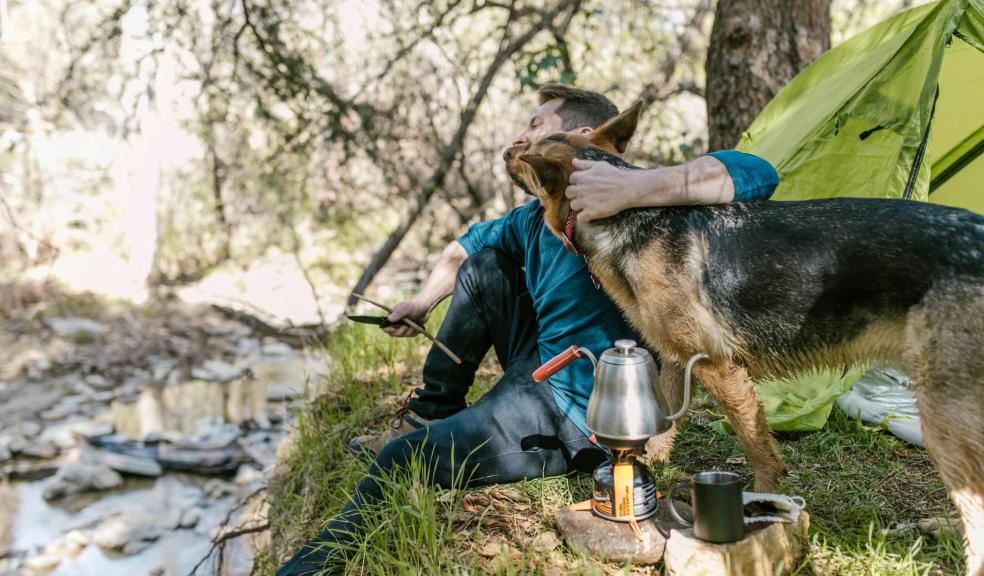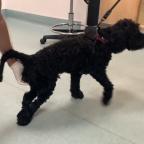
Beginners guide to camping with your dog
Have you ever wanted to take your furry family member camping? As the warmer months roll around, there's never been a better time to try it! Camping can be the ideal getaway for you and your dog, exploring a new place is a great activity for active dogs and their owners.
PDSA Vet Nurse Nina Downing has pulled together some tips to get you started.
Pick the right place
"Before thinking about activities and packing lists, you must carefully consider where your outdoor adventure will take place. Luckily, the UK has many dog-friendly camping and caravan sites, so you'll be spoiled for choice.
Here are a few things to consider when deciding where to go:
-
How far away is it from where you live? Can your dog cope with the journey?
-
Are there lots of dog-friendly walks and activities nearby?
-
What on-site facilities are available for people and dogs?
-
Are there places on-site to safely dispose of your dog's poo?
-
Are there any places on-site where your dog wouldn't be allowed?
-
Is there anywhere you can safely let your dog play off-lead?
-
If you plan to eat out, are there dog-friendly restaurants and pubs nearby?
-
What kind of activities do you and your dog enjoy? Do you prefer spending days on the beach or hiking routes?
-
Have you got adequate insurance to cover third party incidences? Some camp sites may insist on you having it. Insurance is also important to cover vets fees in the case of accident, injury or illness.
Work with the weather
"Cars, vans, tents, and caravans can quickly heat up to dangerous levels, which can lead to heatstroke. For their safety, dogs should never be left alone inside a vehicle, tent, or caravan. It's important to check the weather forecast in the days leading up to your trip.
"If temperatures are soaring, take a rain check and rearrange your trip during a more suitable spell of weather. If temperatures catch you out and do get high, walking your dog when it's cooler in the early morning/evening is best. But it's important to remember that caravans and tents cannot give your dog the protection they need from the heat during the hottest parts of the day, so you will need to find somewhere safe for your dog to stay cool.
"On the hottest days, it is best to avoid walking them altogether, instead they'll need somewhere they can shelter That might mean rearranging your hike or trip to the beach for a cooler day, but pet safety has to come first.
"On the other hand, camping in constant rain is no fun either... especially when it comes to managing those muddy paws! Necessary items for your pet include:
-
A collapsible bowl and water bottle so your dog can have clean water to stay hydrated while walking.
-
If your dog doesn't cope well in the wet, you might consider a waterproof, breathable coat to keep the worst of the rain off.
-
A towel (or two) to clean and dry them after a rain shower or muddy activity.
-
Some comfy blankets to keep them warm during those colder nights.
-
A form of shelter, that has a roof and also a bed that raises them off the ground, to give your dog a break from the weather, and for when the weather is warm and the sun does come out.
-
Set up a relaxing spot under the trees where it's breezy enough for them to stay cool and comfortable, but remember that the sun moves around throughout the day, so you'll need to be sure you can keep them in shade all day long, you might need to provide multiple shaded areas.
-
Cooling mats and collars can be really useful for keeping your dog cool.
Master your dog's packing list
"Your dog's packing list is just as important as your own. When you go camping with your dog, you might need some extra things compared to staying in a hotel or holiday cottage.
Food and feeding accessories
-
Take enough dog food to last your entire trip. Big bags may not be practical, so we'd recommend pre-weighing what they'll need and storing it in an airtight container away from paws reach!
-
Bring dog treats or chews to keep them occupied and reward their good behaviour (in moderation, of course).
Health supplies
-
Carry a doggy first-aid kit with you at all times to treat minor injuries, such as small cuts or grazes and include pet safe suncream. Make sure there is a handy tick remover tool for daily tick checks.
-
Any medication they need for the duration of the trip.
-
Any relaxants or anxiety relief products they will need to keep them calm (e.g. for car travel).
Other essentials
-
Plenty of poo bags
-
A waterproof bed that you can easily remove dirt and mud from.
-
A selection of their favourite vet-approved dog toys to keep them entertained (and offer a sense of comfort).
-
A reflective or flashing collar, lead, or harness for your dog to stay visible at night.
-
If your dog is familiar with one, a tether can be a good addition. Especially if there's a chance they could take off at the first whiff of a barbecue!
Things to remember
-
Make sure your dog always wears a collar and ID tag with your contact details.
-
Before leaving, contact the microchip database to check that your dog's information is correct.
-
In case of an emergency accident or illness, save the contact number for a vet local to where you'll be staying in your phone.
-
As well as knowing the whereabouts of the nearest vet, it may also be a good idea to locate your nearest pet shop. This way, you'll know where to go should you need to buy or replace something for your pet while you're away.
Practice before you go
"If your dog has never gone camping, or it's been a while since you last went together, you might need to give them time to get used to it.
"If you can, pitch your tent in the garden and allow your dog to get used to it well before your trip. Remember to reward them when they choose to go inside (you may need to use a bit of edible persuasion in the form of their favourite treat!).
"Once they're comfortable inside the tent, try setting it up as you would for camping with any roll mats, sleeping bags, or other equipment. Again, let them get used to this and make them a nice comfy bed inside that will be theirs. Scatter some treats in their bed to reward them for getting in and spending time there.
"Once they're happy, try spending a night in your tent. It may sound silly, but it will help your dog feel more comfortable with their surroundings."
For more information visit pdsa.org.uk







